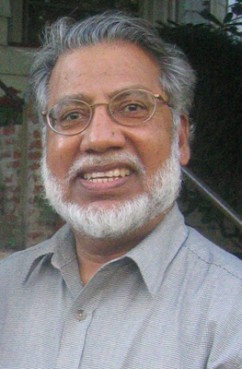
(RNS2-JUL12) Shamshad Ahmad is president of Masjid As-Salam mosque in Albany, N.Y., and a physics professor at the University at Albany. He is the author of “Rounded Up: Artificial Terrorists and Muslim Entrapment After 9/11.” For use with RNS-AHMAD-COLUMN, transmitted July 12, 2010. RNS photo courtesy Shamshad Ahmad.
ALBANY, N.Y. (RNS) Contrary to the post-colonial sense of resentment carried by many European Muslims, American Muslims have a more positive attitude. Since Muslim immigrants have generally enjoyed fair treatment on almost every level of U.S. society, there is no antagonistic relationship between Muslims and their adopted country, despite some disagreements over U.S. foreign policy.
Muslims appreciate the opportunities they have found here, and they strive day and night, like everyone else, to realize the American dream. 9/11, however, changed everything for America, and for American Muslims.
In the wake of the 9/11 attacks, suspicion turned to all Islamic institutions and mosques. Because the 9/11 attacks succeeded due to intelligence failures, the U.S. government poured money and manpower into law enforcement, with the pressure to produce visible results.
Too often based on suspicion alone, thousands of U.S. Muslims were detained and questioned, and their property was seized. Many innocent people fell victim to aggressive policing, and many families, communities and Muslim institutions suffered. Entrapment and pre-emptive prosecution became commonplace.
Coupled with new legislation that permitted government surveillance of U.S. citizens without judicial oversight, and the unprecedented use of classified evidence at trial, the authorities felt empowered.
Masjid As-Salam, the mosque that I founded here in Albany, was put under surveillance soon after 9/11. FBI agents, headquartered in a field office just two miles away, were assigned to investigate Muslim individuals and businesses.
After failing to discover anything that would result in genuine prosecution, the FBI in 2003 manufactured an artificial case through elaborate entrapment tactics. We’re still dealing with the damage that resulted.
The FBI drafted a Pakistani immigrant to help entrap other Muslims by working as an informant. The man was accused of serious crimes in Pakistan and entering the U.S. on a fake passport, and had been convicted for selling fraudulent driver’s licenses in Albany. The government offered him protection, a clean record, cash and citizenship in exchange for going undercover.
The informant zeroed in on the mosque and its imam, Yassin Aref, an Iraqi refugee from Kurdistan who had come to the U.S. through a United Nations refugee resettlement program. The informant posed as a rich businessman, and offered a loan with very attractive terms to a friend of Aref’s who was desperate to save his business. According to Muslim custom, Aref witnessed the loan between the two parties, like a notary public.
The FBI, however, convinced a jury that the imam and his friend were not transacting a simple loan; rather, they were providing material support to terrorism through a money-laundering scheme. Both were convicted and sentenced to 15 years in prison.
Local Muslims were shocked at the entrapment of two innocent family men. Mosque membership dropped from 300 to 200 immediately after their arrests in 2004. People were even frightened to pass by the mosque, or to contact the families of the victims. Our mosque has yet to fully recover.
Nearly nine years after 9/11, American Muslims had hoped the media hype and government policing would have taken a more rational turn by now. We hoped that terror-related events would be treated as criminal acts rather than as wholesale indictments of an entire community and religion.
Unfortunately, the sensationalism of such events remains the same; the purposeful obscuring of facts remains the same; and the general assumption of guilt before innocence remains, unfailingly, the same.
American Muslims are weary of being equated with terrorists. Terrorism is not only against the central beliefs of our peaceful religion — it is against basic common sense for those of us who wish to live and flourish in this country.
We exclude any inappropriate discussion of violence in our mosque, which is part of the reason extremists often shun mosques as being too apologetic. Instead, they favor a radical path that can only be found on the websites of the Islamically illiterate but dangerously persuasive.
We feel depressed, confused and frightened. American Muslims want to live here with pride. We pray for the day when we will be accepted as citizens of this great country, when our patriotism is no longer weighed against our religion.
(Shamshad Ahmad is president of Masjid As-Salam mosque in Albany, N.Y., and a physics professor at the University at Albany. He is the author of “Rounded Up: Artificial Terrorists and Muslim Entrapment After 9/11.” A version of this column originally appeared in the Albany Times-Union.)




